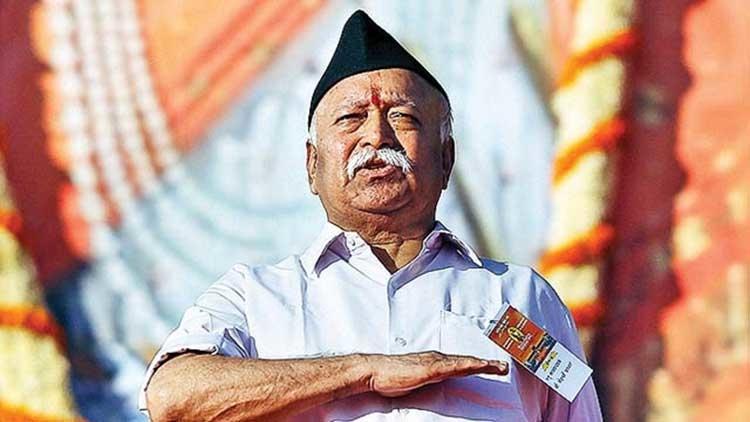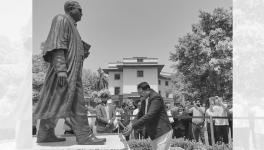Bhagwat Proposes, Adityanath Disposes: What’s RSS Makeover About?

In September 2018, before a diverse audience including diplomats from over 60 countries, Rashtriya Swayamsevak Sangh chief Mohan Bhagwat delivered a three-day lecture series on the topic: Future of Bharat: An RSS perspective. In that speech, Bhagwat said, “Hindu Rashtra does not mean that there should be no Muslims. The day it is said there should be no Muslims, there will be no Hindutva.” His statement, with a philosophical undertone, grabbed headlines.
Cut to September 12, 2021: Chief Minister Adityanath, in a public speech at Kushinagar, Uttar Pradesh, said, “Today, you are getting ration. Were you getting this ration before 2017? Back then, those saying ‘abba jaan’ used to digest the ration.” The media and his audience knew “abba jaan” was code for Muslims. Adityanath went on to launch a tirade against those who say abba jaan—for stealing jobs, for being streetside Romeos who harass women, and for rioting.
Adityanath’s remarks would make it seem Hindutva needs Muslims, not for enriching its philosophy but for the politics of polarisation. By demonising Muslims, the Bharatiya Janata Party, an affiliate of the RSS, hopes to paper over the caste-class divide to unite the Hindus. This has been a work in progress for over three decades—and is expected to intensify as Uttar Pradesh inches closer to electing a new Assembly next year.
So, is Adityanath the human equivalent of the lie-detector test, designed to show that Bhagwat’s expositions on Hindutva are mere intellectual pretences, not to be taken seriously?
Indeed, Bhagwat’s 2018 lecture is not the only instance when he sought to moderate Hindutva. Earlier this month, at a programme organised by the Pune-based Global Strategic Policy Foundation, Bhagwat declared, “The ancestors of Hindus and Muslims are the same. Our motherland and our glorious past are the basis of our unity.” He said Indian tradition is the foundation for national unity. The name of this tradition is Hindu, which, he said, “is not any linguistic or community identity”. He credited this tradition for the “development of human beings”.
Two months ago, on July 4, at a book launch In Ghaziabad, Bhagwat said the DNA of all Indians is the same, irrespective of religion. He said those involved in lynching are against Hindutva. By contrast, Prime Minister Narendra Modi and Home Minister Amit Shah, even though constitutionally bound to protect Indian citizens, have never condemned vigilantes who have killed Muslims. Bhagwat was critical of the quest for the “domination of Hindus,” arguing that the only solution to the Hindu-Muslim discord is dialogue.
Bhagwat’s speeches in Mumbai and Ghaziabad were, however, also peppered with formulations likely to deepen the suspicion of many citizens, particularly those Muslim, regarding the RSS.
In Mumbai for instance, Bhagwat appealed to Muslim intellectuals to “oppose insanity committed by some sections of the community”. By insanity, he presumably meant religious extremism and violence. Analysts would say, the Hindutva brigade has displayed “insanity” with greater frequency than some segments of Muslims have in recent years. Why did Bhagwat fail to make the same appeal to Hindu intellectuals? Is not Bhagwat justifying Hindu extremism as a response to Muslim radicalism?
In his Ghaziabad speech, Bhagwat offered dialogue to resolve the Hindu-Muslim discord. Yet he did not analyse the nature of the discord. In case he had done so, he would have realised that at the root of the Hindu-Muslim conflict are peremptory demands the Sangh makes on Muslims, such as to hand over mosques deemed to have been temples centuries ago. (An analysis of Bhagwat’s Ghaziabad speech can be read here.)
Yet, in one respect, Bhagwat does seem to be fashioning an ideological makeover of the RSS. Hindutva’s traditional position has been that only those for whom India is their Fatherland and holy land are “true Indians”—or indigenous to this country. In other words, those whose religions were not birthed in India are bound to have extra-territorial loyalty. This position excludes Muslims and Christians. Both communities, in addition to the communists, were described as India’s “internal enemies” by the second RSS chief MS Golwalkar.
Bhagwat has negated Hindutva’s traditional position on Muslims and Christians. Not only do Hindus and Muslims share the same ancestors and have the same DNA, India is the motherland for both as they were born here.
Further, in his Ghaziabad speech, Bhagwat asked Muslims not to get “trapped in the cycle of fear that Islam is in danger in India.” His position contrasts with those in the RSS who believe Muslims must be Hinduised, as Walter K Andersen and Sridhar D Damle note in their book, The RSS: A View to the Inside. Bhagwat’s position conforms to what the other section in the RSS believes—that Muslims need to be Indianised.
The term Indianised involves lexical innovations, which Bhagwat has engaged in, for instance, by renaming and trumpeting Indian or Bharatiya tradition as Hindu. Indian Muslims balk at this renaming because it is often invoked to crush their legitimate rights. For instance, the Ayodhya dispute was predicated on the Sangh’s insistence that Muslims must relinquish their claims to the Babri Masjid to show respect to Lord Ram, who, it was argued, is their inheritance as well.
There are other ways to interpret Bhagwat’s recent speeches. One view, articulated in a panel discussion on the YouTube channel of satyahindi.com, holds that his expositions are designed to blunt the sharp anti-Muslim edge of Hindutva, and will have RSS cadres to unlearn their peculiar notions of Muslims, inculcated in them for a century. Bhagwat’s attempt to ideologically reorient the RSS will take time, the panelists said.
There is also an alternative view: Bhagwat’s expositions on Hindutva are designed to address those liberal Hindus who feel disenchanted with the BJP’s inexhaustible capacity to foment hate and social schisms. His moderate language will also allay the fears of Muslims and lull them from consolidating behind the party perceived to be best placed to vanquish the BJP. This theory suffers from one drawback: Bhagwat’s expositions do not count for much in the electoral arena.
Nevertheless, Adityanath’s Kushinagar speech was an open defiance of the RSS boss. Bhagwat has not as yet publicly ticked him off. In case Modi and Shah too resort to dog-whistle politics to polarise Uttar Pradesh, the impression that the RSS chief always calls the shots in the hydra-headed Sangh would be shattered.
For the moment it can be said—Bhagwat proposes, Adityanath disposes. This is why all talk of the ideological makeover of the RSS sounds phoney.
The author is an independent journalist. The views are personal.
Get the latest reports & analysis with people's perspective on Protests, movements & deep analytical videos, discussions of the current affairs in your Telegram app. Subscribe to NewsClick's Telegram channel & get Real-Time updates on stories, as they get published on our website.






















